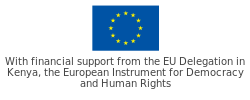
Microsite Strenghtening HR Kenya
Objectives
General objective: To contribute to eradicating all forms of human rights violations within detention and custodial facilities in Kenya.
Specific objective: To strengthen Human Rights Defenders and national security organs to promote structural reforms within the detention facilities system, supporting compliance with and enforcement of the Bill of Rights enshrined in the Constitution of Kenya.
The project is based on 3 main intervention areas:
a) In-depth capacity building for all the Human Rights Defenders in Kenya, targeting the Prison, Probation and Children’s Departments of the Government of Kenya (GoK), magistrates (through the Kenya Magistrates and Judges Association (KMJA)), police officers and Civil Society Organisations (CSOs). The capacity building incorporates facilitating compliance with Kenyan law and strengthening reporting mechanisms for human rights violations through a new Early Warning System (EWS). Furthermore, it ensures the establishment of counselling, education and reintegration sections to enable HRDs to provide related services within 20 detention facilities, and the provision of psychosocial support, aftercare and socio-economic empowerment for reintegrated offenders.
b) The establishment of an Early Warning System (EWS) in Kenya at a national level and within detention facilities for preventing and monitoring cases of human rights violations in the country, under the umbrella of the Kenya National Commission on Human Rights (KNCHR).
c) The improvement of the legal framework in Kenya and the establishment of a National Plan of Action against Human Rights Violations within the justice system. The provision of lobbying and advocacy activities addresses delayed reforms and gaps within existing policies, which are considered the main legal causes of the perpetration and impunity of human rights violations within detention facilities in Kenya.
The project has targeted more than 17,322 beneficiaries, these being inmates, probationers, and Human Rights Defenders. More specifically grouped, these have included:
- About 1,000 detainees in police custody
- About 4,669 detainees in custody awaiting sentence
- About 9,388 sentenced detainees
- About 1,950 detainees in reintegration and aftercare programmes
- About 315 Human Rights Defenders working in the Criminal Justice System (65 custodial agents, 70 from reintegration programmes, 50 from the judiciary, 50 from the police, 50 Human Rights Defenders and legal professionals from civil society organisations, and 30 Children’s Officers)
The facilities targeted by the project were 15 prisons and 5 probation hostels, from Central Kenya to Western Kenya and the coastal area. The project was specifically implemented in:
- 9 women’s prisons: Kitale, Kitui, Malindi, Kisumu, Shimo La Tewa, Kisii, Nakuru, Muranga, Meru
- 4 main prisons: Kingorani, Kangeta, Homabay and Meru
- 2 borstal institutions for young people in conflict with the law: Shikusa in Kakamega and Shimo La Tewa in Mombasa
- 5 probation hostels: Mombasa, Nairobi, Nakuru, Eldoret Jnr. and Snr.
